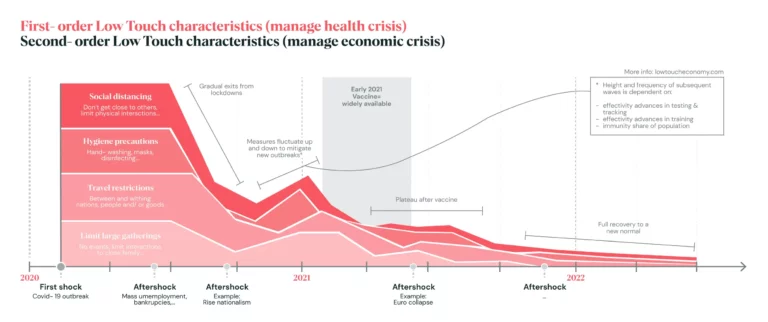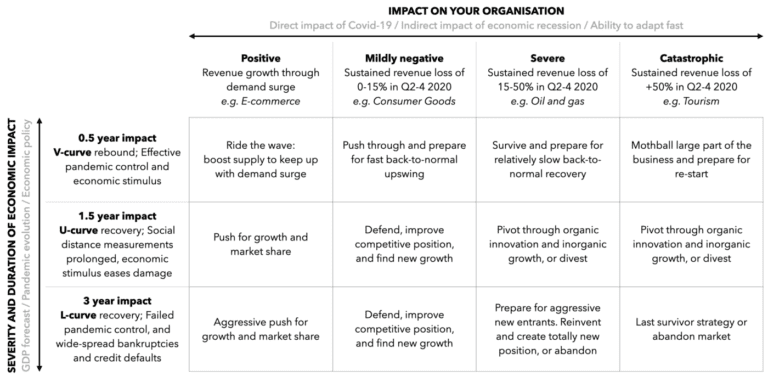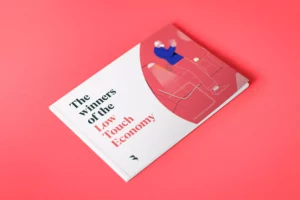Definition of the Low Touch Economy
Society is immensely adaptable when it needs to be.
Welcome to the Low Touch Economy. Forced isolation and social distancing restrictions, put into place during the Covid-19 health crisis, are expected to have a lasting effect on the world as we know it. Or should I say, once knew it.
In just a few weeks time, society has already undergone a major overhaul in the way companies and citizens live and work. It’s truly impressive how adaptable human-kind can be when it needs to.
But with every passing day and with every bit of extra time added to our confinement, it is becoming harder and harder for us to return to the way things were before.
That’s not to say this new world will be better or worse. Just different. With many isolation-induced behaviors becoming ingrained habits that usher in a whole new set of societal norms. During this period of influx, some businesses will thrive in this change and reach accelerated success, while others will struggle to find their footing in all of the chaos.
No matter what. We are all in store for a period of rapid learning, marked by plenty of ups and downs and economic uncertainty.
Welcome to the Low Touch economy.
The next years will be shaped by the current crisis
Remember back when a handshake was the standard form of greeting? For as long as we can remember, the handshake has been used as a way to convey trust between friends, colleagues and even strangers. But in the midst of the current global health crisis, maybe it’s time to examine a new standard gesture.
The Low Touch Economy will go far beyond shaking up the standard handshake. We can expect that the regulations driving change, will also have both short and long-term impacts on consumers and the economy.

And with a vaccine still far off in the horizon, we shouldn’t be getting too comfortable. Buckle up. It’s going to be a rollercoaster ride of trial and error, as our governments try to navigate society to a place where we are ready for recovery.
18-24 months to get back to a new normal. Brace yourself.

So what should companies do in the meantime?
Don’t jump straight into predictions that no one can be sure of. Start by taking a hard look at all the ways in which your business has felt the effect of the Low Touch economy to date. Then start to understand the impact it has had on your supply chain, your industry, your consumers, and lastly society at large.
They say history repeats itself. Start by understanding how similar economic crises have played out in the past for your industry, and then use those learnings to envision the many potential scenarios that could play out in today’s current context. Ask yourself ‘what do I need to do to grow in each of these scenarios” and “what aspects of my portfolio should I lean into?”. The below framework from Board of Innovation can help you in the development of these future scenarios and act as a starting point for your preferred strategies.

We realize that there’s a lot of pressure to mitigate current risks, but we strongly advise you to begin planning for the next phase. Especially as we can safely assume that the next few years will be punctuated by aftershocks to the economy which will need to be continuously factored in. Many of the industries that have been stable for decades are now wide open to turn around. Fast and decisive movers will ultimately be the ones to win. Which quick pivots can you make? How can you fill your innovation pipeline? What does your M&A roadmap look-like to capture non-organic growth in the market?
Take advantage of the new world order to question all of the previous business norms. All rules are off. Try a more agile way of working by running weekly sprints with remote teams, launch a new proposition or business model, hire a growth lead with the skills needed to execute on your strategic plan.
Uncertainty will remain, but so will opportunity
No one can predict the future, we can only prepare for it. Which is why we are cautioning you to map out several scenarios — the good, the bad, and the ugly, while navigating a path towards what’s most likely to occur.
Remember that the Low Touch economy will continue to grow and shift, especially as we brace ourselves for the next waves of uncertainty (e.g. global warming, oil price wars, rise of nationalism, an impending recession). There will also be aftershocks to the macro economy and geopolitics that will need to be taken into account.
But if this crisis has taught us anything, it’s that even in our darkest moments, when we are forced to avoid our need for connection and touch — humans are resilient and the world will always find a way to shine through.

To stay on top of shifts in the low touch economy visit our Low Touch Economy web page and subscribe.


